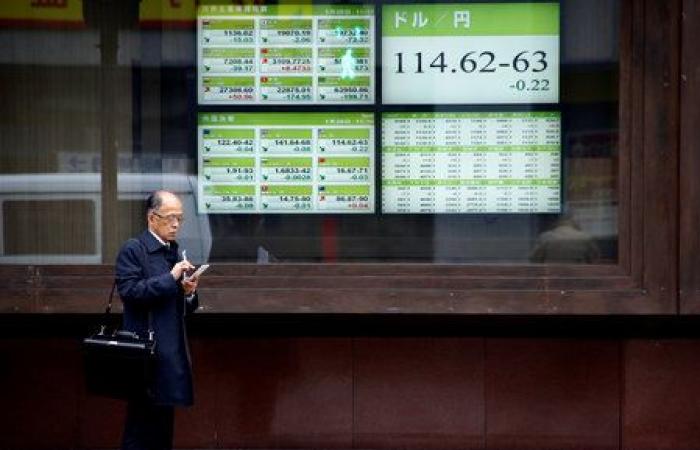Tokyo (awp/afp) – The dollar, boosted by the prospects of Donald Trump’s inflationary policies, continued its crazy rise against the yen on Friday, and the weakening of the Japanese currency helped to support the Tokyo Stock Exchange where bank securities and exporting groups are celebrating.
The dollar still conquering in Asia, electrified by Trump
The greenback had slowed its progress on Thursday after a week of levitation initiated by the election of Donald Trump as president of the United States, but it continued to gain ground on Friday against Asian currencies, in particular the yen.
Raising customs duties, tax cuts and deregulation of the economy… the measures promised by the president-elect could further widen the American public deficit – inflating debt and therefore American bond yields. However, high rates encourage investing in dollars.
Around 03:00 GMT, the greenback climbed to 156.36 yen per dollar, after rising to a new four-month high. He was catching his breath against the common European currency, at 1.0546 dollars to the euro.
The Chinese yuan is also weakened, forcing the central bank (PBOC) to support the currency.
“It is too early to determine the exact economic impact of Trump’s future customs and tax policies” but “the conditions are not present at the moment to see the dollar fall significantly,” warns Lloyd Chan, of the MUFG bank .
According to him, Asian currencies should remain under pressure against the dollar during the first half of 2025, “given the negative consequences of likely increases in US customs duties for economic growth in Asia”.
Bitcoin continued to decline slightly in Asian trading, trading at $88,312 around 03:00 GMT, after reaching all-time highs in recent days.
The Tokyo Stock Exchange climbs, the yen helps
On the Tokyo Stock Exchange, the flagship Nikkei index ended the morning session up 0.80% to 38,842.13 points, while the broader Topix index gained 0.86% to 2,724.35 points.
Japanese mega-banks, Mizuho (+6.34%), MUFJ (+1.19%) and SMFG (+1.13%) rose together, boosted by the increase in their respective annual profit prospects to new record levels, accompanied by plans for share buybacks.
Above all, the weakening of the yen “continues to support the stocks of exporting companies” – like the manufacturer Toyota (+2.04%) or the cosmetics giant Shiseido (+1.32%) -, whose prices sales are becoming more attractive, and the gloomy stock market performances of the last few days encouraged a rebound in the price, notes Kosuke Oka of Monex Securities.
The energy company Kansai Electric Power regained some ground (+1.79%): it collapsed by 18% on Thursday, after announcing that it wanted to raise up to $3.2 billion on the markets, fueling fears. of strong dilution for its current shareholders.
Chinese markets divided, awaiting Alibaba results
Around 03:30 GMT, the Shanghai composite index lost 0.33% to 3,368.46 points, and that of Shenzhen lost 0.76% to 2,044.51 points. In Hong Kong, on the contrary, the Hang Seng index increased by 0.59% to 19,550.08 points.
Chinese markets remained under strong pressure in the perspective of increased trade tensions under a new mandate of Donald Trump: the Hang Seng index in Hong Kong has dropped 15% since his election.
Analysts are also watching for possible additional economic stimulus measures from Beijing in the face of a still gloomy economic situation, the plans announced so far – via increased debt margins for local authorities – having hardly convinced.
The online commerce juggernaut Alibaba, a barometer of consumption in China, climbed 0.17% in Hong Kong before the publication of its quarterly results later on Friday.
Oil takes a nosedive, demand and supply worry
Oil prices started to fall again on Friday in Asian trade, after their technical rebound the day before, in a market still weighed down by the prospect of excess supply in the months to come – the surge in production meeting undermined demand by the worsening economic situation.
Around 03:30 GMT, the price of a barrel of Brent from the North Sea fell 0.65% to close at $72.09, and its American equivalent West Texas Intermediate (WTI) fell 0.68% to $68.23 per barrel. barrel.
afp/cw






